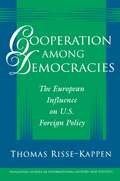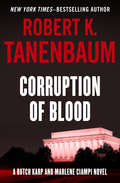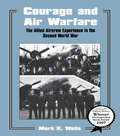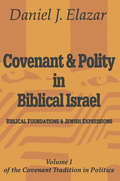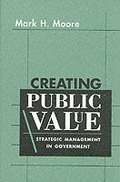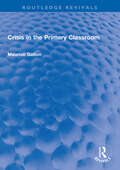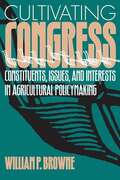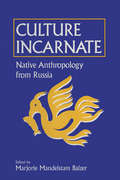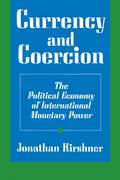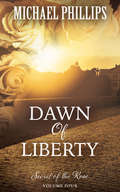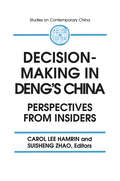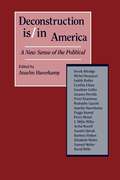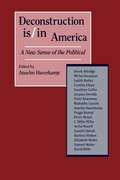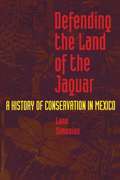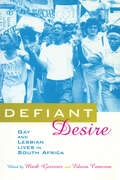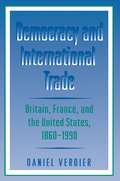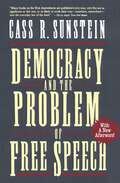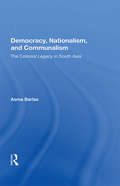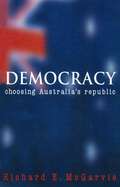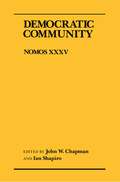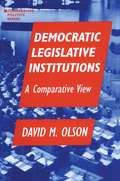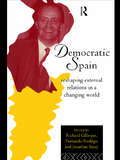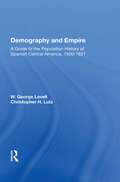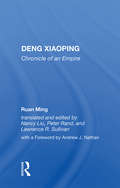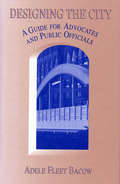- Table View
- List View
Cooperation among Democracies: The European Influence on U.S. Foreign Policy (Princeton Studies in International History and Politics #183)
by Thomas Risse-KappenIn exploring the special nature of alliances among democracies, Thomas Risse-Kappen argues that the West European and Canadian allies exerted greater influence on American foreign policy during the Cold War than most analysts assume. In so doing, he challenges traditional alliance theories that emphasize strategic interactions and power-based bargaining processes. For a better understanding of the transatlantic relationship, the author proposes that we instead turn to liberal theories of international affairs. Accordingly, liberal democracies are likely to form the "pacific federations" described by Immanuel Kant or "pluralistic security communities" as Karl W. Deutsch suggested. Through detailed case studies, Risse-Kappen shows that the Europeans affected security decisions concerning vital U.S. interest during the 1950-1953 Korean war, the 1958-1963 test ban negotiations, and the 1962 Cuban missile crisis--all during a span of time in which the U.S. enjoyed undisputed economic and military supremacy in the alliance. He situates these case studies within a theoretical framework demonstrating that the European influence on decision-making processes in Washington worked through three mechanisms: norms prescribing timely consultations among the allies, use of domestic pressures for leverage in transatlantic interactions, and transnational and transgovernmental coalitions among societal and bureaucratic actors. The book's findings have important repercussions for the post-Cold War era in that they suggest the transatlantic security community is likely to survive the end of the Soviet threat.
Corruption of Blood: Corruption Of Blood, Falsely Accused, Irresistible Impulse, And Reckless Endangerment (Butch Karp and Marlene Ciampi #7)
by Robert K. TanenbaumA prosecutor goes after the truth about JFK&’s assassination in a New York Times–bestselling author&’s &“most enthralling legal thriller to date&” (Vincent Bugliosi). In a forgotten corner of the Georgetown library, New York prosecutor Butch Karp is about to commit a felony. He cracks the seal on a government file, in which he finds papers, a ledger, a reel of film, and a small jar that holds a chunk of human flesh. Just by looking at this material, he has broken the law. It&’s the evidence he needs to prove the true identity of the man who killed Kennedy, and now that he has it, Karp is the most dangerous man in America. Brought to Washington to assist in the Congressional investigation into Kennedy&’s death, Karp was expected to toe the line. As his personal inquiries lead him into a web that stretches from the capos of the mafia to the halls of the Kremlin, this hard-driving attorney realizes the conspiracy that killed Kennedy is still alive—and out for blood. As deputy chief counsel to the 1976 House Select Committee on Assassinations, Robert K. Tanenbaum has an insider&’s understanding of one of the darkest days in American history. Corruption of Blood is a novel inspired by real events by an author who &“knows his criminal procedure cold&” (Publishers Weekly). This ebook features an illustrated biography of Robert K. Tanenbaum including rare photos from the author&’s personal collection.
Courage and Air Warfare: The Allied Aircrew Experience in the Second World War (Studies in Air Power #Vol. 2)
by Mark K. WellsColonel Wells investigates the nature of aerial warfare and the men who took part. The book analyzes aircrew selection, reaction to combat, adaptability to stress, morale, leadership and combat effectiveness, and compares the efforts of the US Eighth Air Force and RAF Bomber Command.
Covenant and Polity in Biblical Israel: Volume 1, Biblical Foundations and Jewish Expressions: Covenant Tradition in Politics (The Covenant Tradition in Politics)
by Daniel J. ElazarIn this first volume of a trilogy, Daniel J. Elazar addresses political uses of the idea of covenant, the tradition that has adhered to that idea, and the political arrangements that flow from it,Among the topics covered are covenant as a political concept, the Bible as a political commentary, the post-biblical tradition, medieval covenant theory, and Jewish political culture.
Creating Public Value: Strategic Management in Government
by Mark H. MooreA summation of 15 years of research on what public-sector executives should do to improve the performance of public enterprises. Cases are used to illuminate their broader lessons for government managers.
Crisis in the Primary Classroom (Routledge Revivals)
by Maurice GaltonFirst published in 1995, Crisis in the Primary Classroom redefines the crisis plaguing primary classrooms by challenging many of the educational and political orthodoxies of the nineties. The book is set during a particular period in the nineties when primary education was under attack from the Government and sections of the media, with accusations that reading standards had fallen, the National Curriculum was not being taught well and training colleges had failed to produce sufficient teachers of quality. In response to these concerns, the Government commissioned a report, which presented a series of solutions. Maurice Galton argues that the report failed to identify the root causes of the problems facing primary schools. He examines critically whether the National Curriculum was necessary, and whether teaching methods and classroom organization really needed to be changed radically. He also addresses the issue of quality among teachers, suggesting ways in which this might be developed. Crisis in the Primary Classroom deserves to be read by all concerned with the planning, administration and practice of primary education. Teachers will be encouraged by the message that methods found to be successful in the past must be accommodated in new patterns of organization and classroom practice.
Cultivating Congress: Constituents, Issues, and Interests in Agricultural Policymaking
by William P. BrowneCongress in the mid-1990s remains the object of voter discontent. Public outcries against special interests and unresponsive incumbents have amplified an already pervasive skepticism toward Beltway politics. And while Congress continues to conduct its business, William Browne argues that it is no longer business as usual. Browne opens up the inner sanctums of Congress to reveal how that institution's daily operations-i. e. , its policymaking processes-have changed dramatically. He argues that Congress is no longer dominated by party and committee power-brokers, large organized interest groups, or intrusive federal agencies. Instead, he contends, congressional members are driven largely by grassroots issues and constituent interests. This shift occurred in response to reforms that diluted the congressional seniority system and empowered the rank-and-file to exert greater influence in policymaking. More members now generate more issues much earlier in that process, resulting in a greater diversity of views in previously entrenched policy domains, but also greater disorganization and less predictability. Those changes are nowhere more apparent than in the ever shifting arena of agricultural policymaking, which, as the single largest contributor to our GNP, remains a central part of American politics. As agriculture has become more fragmented, globalized, and environmentally aware, agricultural policymaking has grown increasingly complex. In the process, a cacophony of constituent policy demands has altered the way congressional members "play the game. " Browne reveals exactly how that new game is played. Based on nearly 450 interviews with members of Congress, their staff, agency administrators, and lobbyists, Browne's study is timed to appear during the 1995 Congressional debates over a major new agriculture bill. His book should become a major resource--for congressional staff, journalists, political scientists, economists, lobbyists, and policy administrators--for understanding those debates.
Culture Incarnate: Native Anthropology from Russia
by Marjorie Mandelstam BalzerThis collection of studies uses the processes of analysis and self-analysis to examine the social, political and spiritual forces at work in the post-Soviet world. The text includes discussions of ethnohistory, political anthropology and ethnic conflict, and symbolic anthropology.
Currency and Coercion: The Political Economy of International Monetary Power
by Jonathan KirshnerJonathan Kirshner here examines how states can and have used international currency relationships and arrangements as instruments of coercive power for the advancement of state security. Kirshner lays the groundwork for the study of what he calls monetary power by providing a taxonomy of the forms that such power can take and of the conditions under which it can have effect. He then establishes the actual existence of monetary power by showing how the taxonomy is supported by the historical record, including cases from nations from all over the globe and throughout the twentieth century. He uncovers how monetary power is affected by different monetary regimes, the sources of its success and failure, and the factors that lead states to turn to its use. Kirshner thus succeeds in developing a generalized framework for the analysis of an important yet neglected form of state power that is likely to be of increasing importance in the post-Cold War era. Although some distinguished scholars have touched on the issue of monetary power, there has been until now no standard text on the subject. Integrating security studies and international political economy, this book is a timely synthesis that will be important to the entire discipline of international relations.
Dawn of Liberty (Secret of the Rose #4)
by Michael PhillipsPolitical unrest shakes the foundations of a war-torn country—and of the McCallum family as they fight for their faith in the Secret of the Rose series. Many years after their daring escape from a divided Germany, Sabina and Matthew McCallum return with their son, Tad, to attend a conference on preaching the gospel of Christ in a country still scarred by the Cold War. What they discover is troubling. Western Christianity, while well intentioned, is not filling the unique needs of Christians in the East. And even though the Cold War is over, political strife is bubbling just below the surface, and Sabina and Matthew become entangled in a Communist plot to seize control of Eastern Europe. Once again, the couple must call upon their instinctive talent for survival—and their deep faith in God&’s protection—to save their family.
Decision-making in Deng's China: Perspectives from Insiders (Studies On Contemporary China)
by A. Doak Barnett Suisheng Zhao Carol Lee HamrinConsiders the politics of central decision-making by focusing on senior policy makers and implementing bureaucracies on the one hand, and actors in economic and non-economic arenas on the other. The contributors held significant party and government positions in China up to 1989.
Deconstruction Is/In America: A New Sense of the Political
by Anselm HaverkampWhat impact has deconstruction had on the way we read American culture? And how is American culture itself peculiarly deconstructive? To address these questions, this volume brings together some of the most provocative thinkers associated with deconstruction, among them Jacques Derrida, Judith Butler, and Avital Ronnel. Ranging across a wide field, from the ethics of reading to the rhetoric of performance, the contributors offer provocative insights into a new sense of the political. The America of the volume's title turns out to be the place where the politics and poetics of responsibility meet. It is also the place where we confront the tension between difference and profound otherness.
Deconstruction Is/In America: A New Sense of the Political (Open Access Lib And Hc Ser.)
by Anselm Haverkamp H. R. DodgeWhat impact has deconstruction had on the way we read American culture? And how is American culture itself peculiarly deconstructive? To address these questions, this volume brings together some of the most provocative thinkers associated with deconstruction, among them Jacques Derrida, Judith Butler, and Avital Ronnel. Ranging across a wide field, from the ethics of reading to the rhetoric of performance, the contributors offer provocative insights into a new sense of the political. The America of the volume's title turns out to be the place where the politics and poetics of responsibility meet. It is also the place where we confront the tension between difference and profound otherness.
Defending the Land of the Jaguar
by Lane SimonianMexican conservationists have sometimes observed that it is difficult to find a country less interested in the conservation of its natural resources than is Mexico. Yet, despite a long history dedicated to the pursuit of development regardless of its environmental consequences, Mexico has an equally long, though much less developed and appreciated, tradition of environmental conservation. Lane Simonian here offers the first panoramic history of conservation in Mexico from pre-contact times to the current Mexican environmental movement. He explores the origins of conservation and environmental concerns in Mexico, the philosophies and endeavors of Mexican conservationists, and the enactment of important conservation laws and programs. This heretofore untold story, drawn from interviews with leading Mexican conservationists as well as archival research, will be important reading throughout the international community of activists, researchers, and concerned citizens interested in the intertwined issues of conservation and development.
Defiant Desire: Gay and Lesbian Lives in South Africa
by Mark Gevisser Edwin CameronDefiant Desire records the lives of lesbian and gay South Africans of all races as they have lived in the face of censure, denial and oppression. The history of gay identity in South Africa is here in its past and present aspects: from a drag salon in Woodstock to a gay "shebeen" in kwaThema; from a church in a Pretoria nightclub to Johannesburg's lesbian and gay pride march; from Afrikaans love poetry to new activism. The book is a document of lesbian and gay struggle, and indispensable for those interested in the sexual politics coursing beneath the country's troubled passage to democracy.
Democracy and International Trade: Britain, France, and the United States, 1860-1990
by Daniel VerdierIn this ambitious exploration of how foreign trade policy is made in democratic regimes, Daniel Verdier shows that special interests, party ideologues, and state officials and diplomats act as agents of the voters. Constructing a general theory in which existing theories (rent-seeking, median voting, state autonomy) function as partial explanations, he shows that trade institutions are not fixed entities but products of political competition.
Democracy and the Problem of Free Speech
by Cass R. SunsteinFreedom of speech is one of our greatest legal rights and Cass Sunstein is one of our greatest legal theorists. This book is a must read for anyone who wants to think seriously about the free speech issues facing this generation.-- Akhil Amar, Southmayd Professor, Yale Law SchoolThis is an important book. Beautifully clear and carefully argued, Sunstein's contribution reaches well beyond the confines of academic debate. It will be of interest to any citizen concerned about freedom of speech and the current state of American democracy.-- Joshua Cohen, Massachusetts Institute of TechnologyHow can our constitutional protection of free speech serve to strengthen democracy? Cass Sunstein challenges conventional answers with a remarkable array of lucid arguments and legal examples. There is no better book on the subject.-- Amy Gutmann, Laurance S. Rockefeller University Professor, Princeton University
Democracy, Nationalism, And Communalism: The Colonial Legacy In South Asia
by Asma BarlasAlthough India and Pakistan were part of a single state until liberation from British colonial rule in 1947, the former has since emerged as the world's largest "democracy, whereas the latter has been under military control for most of its history. In this thought-provoking volume, Asma Barlas explores the complex and delicate issue of democracy in
Democracy: Choosing Australia's Republic
by Richard McGarvieIt is of vital importance to the future of Australia's democracy and federation that the right decision be made on the republic issue. This is not a simple question of choosing between a monarchy and a republic, between the Queen and an Australian head of state, though that choice does need to be made. But before Australians can make that choice, they need a proper understanding of our present system, and they must be offered a republic that preserves the quality of democracy of that system, not one that would degrade it. In Democracy, Richard McGarvie explains the evolution of our system of government, the safeguards provided by the roles of the governor-general and state governors, and why the reserve powers and the constitutional conventions are so important. McGarvie's meticulous examination of the proposed models for a republic, including the Turnbull model proposed in the November 1999 referendum question, exposes the dangers in choosing the wrong republic. He warns that the method of appointment and dismissal of the head of state are crucial to the maintenance of our democracy. If Australia does choose to become a republic, there is a safe way to proceed. Democracy shows the way.
Democratic Community: Nomos XXXV (NOMOS - American Society for Political and Legal Philosophy #28)
by Ian Shapiro John W. ChapmanA state-of-the-art meditation on relations, theoretical and practical, among a familiar triad of themes: comunitarianism, liberalism, and democracy.--American Political Science Review A collection of distinguished contributors, from a wide range of disciplines, examine the implications of the resurgence of interest in community. The chapters in Democratic Community consider the fundamental issues that divide liberals and communitarians, as well as the structure of communities, the roles of freedom and democratic institutions in sustaining one another, the place of a democratic civil society in a democratic polity, and the contributions of feminist thinking.This thirty-fifth volume in the American Society of Political and Legal Philosophy series is devoted, as is each volume in the series, to a single topic-- in this case, the implications for human nature and democratic theory of the resurgence of interest in community. Democratic Community deals not only with fundamental issues that divide liberals and communitarians, but is also concerned with the structure of communities, the roles of freedom and democratic institutions in sustaining one another, the place of a democratic civil society in a democratic polity, and the contributions of feminist thinking to the great debate. The collection of distinguished contributors, from a wide range of disciplines, includes: Richard J. Arneson (University of California, San Diego), Jean Baechler (University of Paris, Sorbonne), Christopher J. Berry (University of Glasgow), Robert A. Dahl (Yale University), Martin P. Golding (Duke University), Carol C. Gould (Stevens Institute of Technology), Amy Gutmann (Princeton University), Jane Mansbridge (Northwestern University), Kenneth Minogue (London School of Economics), Robert C. Post (University of California, Berkeley), David A. J. Richards (New York University), Gerald N. Rosenberg (University of Chicago), Bruce K. Rutherford (Yale University), Alan Ryan (Princeton University), and Carmen Sirianni (Brandeis University).
Democratic Legislative Institutions: A Comparative View
by David M. OlsonThis text summarizes the research on, and experiences of, democratic legislatures around the world. It focuses on what legislatures are and what they do - as both consequence of and contributor to democratic self-government.
Democratic Spain: Reshaping External Relations in a Changing World (Routledge Research in European Public Policy)
by Richard Gillespie Fernando Rodrigo Jonathan StorySince the death of General Franco in 1975, Spain has emerged from relative isolation to play an active role in international affairs. Membership of the European Union and Nato have been keys to Spain's new prominence, although the country has also tried to build on its traditional "special relationships" with Latin America and the Arab world. This is the first thorough study of democratic Spain's re-emergence on the international scene.By focusing on the relationship between external relations and domestic policy the book makes an important contribution to the literature on democratisation, as well as showing how Spanish foreign policy evolved between the mid-1970s and mid-1990s.While the book focuses on democratic Spain, its revisionist view of democratic transitions is of more general relevance. Democratization is seen as an integral process involving related, though not simultaneous changes in domestic policy and external relations. Only with the transformation of her external relations did Spain's new democracy finally become consolidated.This book will be required reading for students of Spanish politics and will also be useful to those interested in the process of democratization.
Demography And Empire: A Guide To The Population History Of Spanish Central America, 1500-1821
by W. George LovellResearch on the Central American colonial experience-long overshadowed by the scholarly focus on Mexico and Peru-has begun to blossom, greatly expanding our knowledge of land and life in the region under Spanish rule. The first bibliography of its kind, Demography and Empire offers a comprehensive survey of recent literature in Spanish and i
Deng Xiaoping: Chronicle Of An Empire
by Ruan MingIn 1978, Deng Xiaoping, China's paramount leader, launched the economic reforms that turned the world's most populous nation into an economic dynamo. Yet Deng also shaped the destiny of a China that to this day is locked in the iron embrace of the Chinese Communist Party and its ancient, intractable leaders—even though early in his regime Deng had
Designing the City: A Guide For Advocates And Public Officials
by Adele Fleet BacowWritten in a clear and engaging style, Designing the City is a practical manual for improving the way communities are planned, designed, and built. It presents a wealth of information on design and decision-making, including advice on how citizens and activists can make their voices heard, and numerous examples of effective strategies for working with all parties involved in neighborhood and community development. It highlights proven models and strategies to help communities: *establish unique and productive partnerships with public works and transportation departments *develop resources through grant programs *broaden expertise, perspective, and constituency *create new and enduring models for effective action *educate participants and consumers of the design and development process
